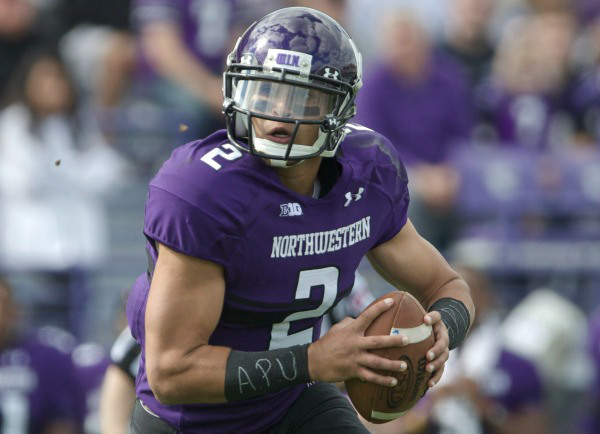Should Northwestern Football Players Be Allowed to Unionize?

Kain Colter, leader of the labor movement, typically sports wrist tape bearing the acronym APU, standing for “All Players United.” (Photo via Sports Illustrated)
May 6, 2014
College football and unionization don’t initially seem fit for each other. College athletes have long carried a connotation of being students first; of working for the betterment of both themselves and the name on the front of their jersey; and of course, of being campus gods who couldn’t possibly be discontent in their situations.
This collective idea of college athletes is not only outdated, but dead wrong.
College athletes are the unpaid employees of a multi-billion dollar business. College athletes are exploited for their hard work. Most high-major college athletes don’t attend college classes, ironically. But the most baffling inequity of them all, perhaps, is that these players have no voice whatsoever in the business they run themselves.
“It’s almost like a dictatorship,” said union movement leader Kain Colter when asked about the NCAA in a press conference. “We want someone who is going to be looking out for us.”
A student-athlete who cannot formally voice his opinion past his own coach and athletic director; who cannot petition for change on a larger scale; who cannot fight for the legal and medical rights of his fellow teammates, other teams’ players, and the future workers in the college football business is not a student-athlete — but indeed a serf among nobles.
And the reason Colter, the former Northwestern speedster, has become the NCAA’s arch nemesis is that he’s had the courage to break every one of this implied system’s rules to voice the opinions of college football players nationwide. What also makes Colter’s case different than those past is that he’s not asking for checks, but medical rights and a voice in legislation and leadership.
“A lot of people will think this is all about money; it’s not,” he told the Chicago Tribune’s Teddy Greenstein. “We’re asking for a seat at the table to get our voice heard.”
A seat at the table is what they were indeed granted a few weeks ago when the National Labor Relations Board agreed with Colter’s compelling case and ruled that Northwestern “student-athletes” were actually employees of the university. Baffled, Northwestern University immediately appealed the ruling, spewing loosely connected counterarguments that Colter easily countered as nonsensical and even fearful. For example — Northwestern argued that student-athletes were not employees of the university; that they provided plenty of opportunities for athletes to put their education before their achievements on the field. Colter, however, revealed that many players are steered toward “easy” majors as to maintain their athletic eligibility.
“[They’re] receiving a degree, but they are not truly receiving an education,” Colter told Greenstein.
His argument included that there’s “no way” around the fact that football is a “job” to both himself and his teammates. And when looking at college football in a business perspective, there’s also no way around the fact that college football players are subjected to the dysfunctional leadership of the NCAA. Although the idea of player unionization is premature relative to change on a larger scale, it’s certainly a step in the right direction to reforming the structure of the college athletics.
Nazareth junior Sydney Stancik disagrees with the recent reform movement occurring in the college athletics world. “Scholarship money and other benefits adequately compensate an athlete in place of money or a voice. If they want to make the most of their college experience like everyone else, the school provides plenty of opportunities to do so.”
Fellow junior Carl Robst, however, supports the idea that college athletics deserve administrative reform. “Schools offer athletes to play sports, not get an education,” Robst says. “No matter how much scholarship money you get, it’s not right for a student to work fifty or more hours per week for the school’s name and not have a voice in their own business.”
The Northwestern players had a chance at reform on April 25th, where they voted on whether to uphold the NLRB’s recent ruling. The results may not be revealed for a few months, or years even, but Colter’s focus had always been on future change rather than immediate impact.
“They are voting for the future generations, and they are voting for the 9-year-olds right now who dream of playing college sports,” Colter told Mike Wise of the Washington Post before the voting. “It’s truly about, ‘Are you going to set these kids up for success? Are you going to allow them to have a voice and guarantee their basic protections and their basic rights?’”
